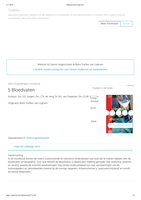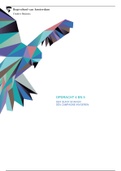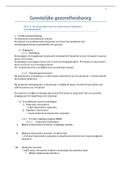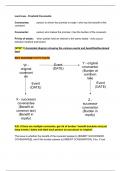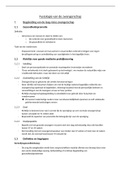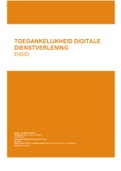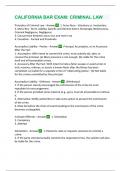Week 1
Entertainment (Oliver)
Human beings have a fundamental need for entertainment, as demonstrated through history:
gladiator fights, storytelling, dance and theatre. Modern media rely on entertainment, even news
carries element-like qualities.
Theories
Entertainment = media consumed for leisure rather than information or persuasion, often centred
on electronic media like TV and films
Uses and gratification theory (U&G): audiences actively choose media to fulfil needs as
social connection, status or escapism. Early studies explored gratifications from specific
formats like radio soap operas or quiz shows, now the research expanded to TV and the
internet.
Mood management theory: people select media to regulate emotions/moods: maintaining
a positive mood or alleviating negative ones. Those in negative moods often choose
uplifting media.
Media enjoyment = nuanced state influenced by emotional appraisals and attitudes, which can
fluctuate during and after consumption. Within enjoyment, narratives play a critical role. Enjoyment
goes beyond simple feelings of joy or laughter, encompassing a complex, multifaced experience
that includes serenity, suspense, or sensory delight.
Disposition theory: viewers’ model judgements about characters impact their enjoyment,
with positive outcomes for liked characters and negative outcomes for disliked ones, being
more gratifying. The theory explains enjoyment as morally complex, such as when ‘good’
characters engage in reprehensible actions, which behaviour may be justified as okay by
the audience through model disengagement. Empirical support for this theory are genres
like crime drama, sports and soap operas. Heightened joy can follow into anxiety
(excitation transfer).
Models and frameworks:
Vorderer et al.: prerequisite for enjoyment can be scepticism, competition and empathy.
The emphasis is on suspension of disbelief.
Nabi and Krcmar – tripartite model: treat enjoyment as an attitude, which integrates
affective, cognitive and behavioural responses
Motivations for media consumption
While media entertainment is often positively associated with pleasure, but it also covers tragic and
melancholic content (sad films, mournful songs, stories of suffering). The notion that audiences are
purely pleasure-seeking is with that challenged. Such content highlights additional motivations for
media consumption, including engagement, meaningfulness and eudaimonia.
Engagement enhances enjoyment, even when the emotions evoked are not traditionally
positive (horror, sadness, disgust) → focussing on pleasure and positive effect = hedonic
motivations. Extreme engagement is referred to as:
- Transportation: becoming deeply immersed in a narrative, losing awareness of your
surroundings, like a ‘flow’ that involves cognitive and emotional absorption in a fake world
Tragedy and appreciation: tragic media don’t fit the definition of ‘enjoyment’, though it
provides valuable experiences (fostering empathy, recognizing vulnerabilities, emotional
wellness). There is a difference between enjoyment and appreciation when analysed complex
media experience like tragedies
, - Enjoyment = pleasure-focused
- Appreciation = meaning-focused
Eudaimonic motivations focus on seeking insight and purpose, involving preferences for tragic
content that elicits mixed emotions and deeper reflection. Eudaimonia a:
- State (temporary need for insight)
- Trait (enduring preference for meaningful experience): research shows that eudaimonia
motivations correlate with individual traits like self-reflectiveness and the search for meaning.
These motivations lead to preferences for media that evoke tender, introspective or inspiring
feelings rather than solely positive emotions (correlated with mood-management theories)
Technology advantages
The media entertainment landscape has undergone rapid transformation, driven by technological
advancements and shifts in consumer behaviour. This revolution presents opportunities and
challenges for research, requiring the development of new theories, methodologies and
conceptual frameworks.
Entertainment is more accessible than ever, with platforms like streaming services, social
media and gaming revolutionizing how audiences consumer content. Greater content
selectivity challenges traditional media exposure, shifting away from shared mass-audience
experiences to highly individualized consumption. Users can now control narratives, create
content and engage through gaming or YouTube. Interactivity enriches engagement, but
complicates predictive research models.
Mobility causes people to have entertainment from fixed locations in the daily activities,
influencing multitasking, social interactions and public-private boundaries, requiring
rethinking of traditional theories like mood management.
Researchers are trying to intergrade complexities that come with interactivity, user-
generated content and mobility. Users have now become both the create and the
consumer.
,Entertainment effects: enjoyment (Eden)
Enjoyment (Zillmann) =
- First simplistic pleasure-focused models: a combination of arousal (or excitation) and
positive affect, experienced through empathetic responses to actions/characters, which
can be pleasant, as well as unpleasant (relying solely on concepts as liking, appreciation
and preference is insufficient for capturing the complexity of enjoyment in various forms of
media, especially in non-narrative entertainment)
- Later: holistic attitude, in which emotional, behavioural and cognitive evaluations get
reflected and where deep focus and engagement result in motivation (broader
perspective)
Early perspectives
- Historically, media emphasized the negative effects of entertainment, despite discussions by
Aristotle and Plate on pleasure and entertainment
- In the 20th century, studies were aimed to understand why media appeals to audiences by
investigating audiovisual media availability, designed for enjoyment (1960)
- 1970-1990: research on enjoyment, which concluded that enjoyment stems from cognitive
and emotional reactions to media → influential theories that explain how viewers
experience enjoyment from media content through arousal, empathic connection and
mood regulation:
Arousal → excitation transfer theory: arousal enhances enjoyment through emotions. Further
research on this theory (three-factor theory of empathy) explained that empathy involves
automatic, learned and deliberate processes that evoke sympathetic responses to
characters, by eventually feeling enjoyment
Arousal → enjoyment + empathy → sympathetic responses → enjoyment
Empathic connection → disposition theory: denigrating (disparagement humour) is enjoyed
more when viewers dislike the targeted character. In drama, moral alignments shape
enjoyment, because viewers justify their pleasure based on a character’s perceived
goodness or badness
Viewer’s attitude toward characters → enjoyment
Mood management theory: people choose media that improves their mood, based on the
principle of hedonic regulation → media choices are efforts to enhance positive moods or
diminish negative ones
Mood evaluation → media choice → improving mood → enjoyment
Shift towards broader perspectives
1990: the definition of entertainment got to include a range of emotional experiences beyond
mere enjoyment. Three components of entertainment in which enjoyment is a small aspect:
1. Active (stimulation and suspense)
2. Tension-reducing (relaxation)
3. Positive (joy and pleasure)
, New theories include psychological needs as intrinsic motivation that signals need satisfaction
- Hedonic needs: pleasurable (enjoyment results from satisfying any needs)
- Nonhedonic needs: meaningful (pleasure)
Media enjoyment supports personal growth, arising when media help users regain balance and
self-regulation. This is measured by multidimensional scales, assessing cognitive, affective and
behavioural dimensions. Self-reports are criticized for their subjectivity. Alternative measurements
are psychophysiology (facial electromyography, skin conductance) and MRI, correlating
enjoyment with neural activity patterns.
Entertainment (Oliver)
Human beings have a fundamental need for entertainment, as demonstrated through history:
gladiator fights, storytelling, dance and theatre. Modern media rely on entertainment, even news
carries element-like qualities.
Theories
Entertainment = media consumed for leisure rather than information or persuasion, often centred
on electronic media like TV and films
Uses and gratification theory (U&G): audiences actively choose media to fulfil needs as
social connection, status or escapism. Early studies explored gratifications from specific
formats like radio soap operas or quiz shows, now the research expanded to TV and the
internet.
Mood management theory: people select media to regulate emotions/moods: maintaining
a positive mood or alleviating negative ones. Those in negative moods often choose
uplifting media.
Media enjoyment = nuanced state influenced by emotional appraisals and attitudes, which can
fluctuate during and after consumption. Within enjoyment, narratives play a critical role. Enjoyment
goes beyond simple feelings of joy or laughter, encompassing a complex, multifaced experience
that includes serenity, suspense, or sensory delight.
Disposition theory: viewers’ model judgements about characters impact their enjoyment,
with positive outcomes for liked characters and negative outcomes for disliked ones, being
more gratifying. The theory explains enjoyment as morally complex, such as when ‘good’
characters engage in reprehensible actions, which behaviour may be justified as okay by
the audience through model disengagement. Empirical support for this theory are genres
like crime drama, sports and soap operas. Heightened joy can follow into anxiety
(excitation transfer).
Models and frameworks:
Vorderer et al.: prerequisite for enjoyment can be scepticism, competition and empathy.
The emphasis is on suspension of disbelief.
Nabi and Krcmar – tripartite model: treat enjoyment as an attitude, which integrates
affective, cognitive and behavioural responses
Motivations for media consumption
While media entertainment is often positively associated with pleasure, but it also covers tragic and
melancholic content (sad films, mournful songs, stories of suffering). The notion that audiences are
purely pleasure-seeking is with that challenged. Such content highlights additional motivations for
media consumption, including engagement, meaningfulness and eudaimonia.
Engagement enhances enjoyment, even when the emotions evoked are not traditionally
positive (horror, sadness, disgust) → focussing on pleasure and positive effect = hedonic
motivations. Extreme engagement is referred to as:
- Transportation: becoming deeply immersed in a narrative, losing awareness of your
surroundings, like a ‘flow’ that involves cognitive and emotional absorption in a fake world
Tragedy and appreciation: tragic media don’t fit the definition of ‘enjoyment’, though it
provides valuable experiences (fostering empathy, recognizing vulnerabilities, emotional
wellness). There is a difference between enjoyment and appreciation when analysed complex
media experience like tragedies
, - Enjoyment = pleasure-focused
- Appreciation = meaning-focused
Eudaimonic motivations focus on seeking insight and purpose, involving preferences for tragic
content that elicits mixed emotions and deeper reflection. Eudaimonia a:
- State (temporary need for insight)
- Trait (enduring preference for meaningful experience): research shows that eudaimonia
motivations correlate with individual traits like self-reflectiveness and the search for meaning.
These motivations lead to preferences for media that evoke tender, introspective or inspiring
feelings rather than solely positive emotions (correlated with mood-management theories)
Technology advantages
The media entertainment landscape has undergone rapid transformation, driven by technological
advancements and shifts in consumer behaviour. This revolution presents opportunities and
challenges for research, requiring the development of new theories, methodologies and
conceptual frameworks.
Entertainment is more accessible than ever, with platforms like streaming services, social
media and gaming revolutionizing how audiences consumer content. Greater content
selectivity challenges traditional media exposure, shifting away from shared mass-audience
experiences to highly individualized consumption. Users can now control narratives, create
content and engage through gaming or YouTube. Interactivity enriches engagement, but
complicates predictive research models.
Mobility causes people to have entertainment from fixed locations in the daily activities,
influencing multitasking, social interactions and public-private boundaries, requiring
rethinking of traditional theories like mood management.
Researchers are trying to intergrade complexities that come with interactivity, user-
generated content and mobility. Users have now become both the create and the
consumer.
,Entertainment effects: enjoyment (Eden)
Enjoyment (Zillmann) =
- First simplistic pleasure-focused models: a combination of arousal (or excitation) and
positive affect, experienced through empathetic responses to actions/characters, which
can be pleasant, as well as unpleasant (relying solely on concepts as liking, appreciation
and preference is insufficient for capturing the complexity of enjoyment in various forms of
media, especially in non-narrative entertainment)
- Later: holistic attitude, in which emotional, behavioural and cognitive evaluations get
reflected and where deep focus and engagement result in motivation (broader
perspective)
Early perspectives
- Historically, media emphasized the negative effects of entertainment, despite discussions by
Aristotle and Plate on pleasure and entertainment
- In the 20th century, studies were aimed to understand why media appeals to audiences by
investigating audiovisual media availability, designed for enjoyment (1960)
- 1970-1990: research on enjoyment, which concluded that enjoyment stems from cognitive
and emotional reactions to media → influential theories that explain how viewers
experience enjoyment from media content through arousal, empathic connection and
mood regulation:
Arousal → excitation transfer theory: arousal enhances enjoyment through emotions. Further
research on this theory (three-factor theory of empathy) explained that empathy involves
automatic, learned and deliberate processes that evoke sympathetic responses to
characters, by eventually feeling enjoyment
Arousal → enjoyment + empathy → sympathetic responses → enjoyment
Empathic connection → disposition theory: denigrating (disparagement humour) is enjoyed
more when viewers dislike the targeted character. In drama, moral alignments shape
enjoyment, because viewers justify their pleasure based on a character’s perceived
goodness or badness
Viewer’s attitude toward characters → enjoyment
Mood management theory: people choose media that improves their mood, based on the
principle of hedonic regulation → media choices are efforts to enhance positive moods or
diminish negative ones
Mood evaluation → media choice → improving mood → enjoyment
Shift towards broader perspectives
1990: the definition of entertainment got to include a range of emotional experiences beyond
mere enjoyment. Three components of entertainment in which enjoyment is a small aspect:
1. Active (stimulation and suspense)
2. Tension-reducing (relaxation)
3. Positive (joy and pleasure)
, New theories include psychological needs as intrinsic motivation that signals need satisfaction
- Hedonic needs: pleasurable (enjoyment results from satisfying any needs)
- Nonhedonic needs: meaningful (pleasure)
Media enjoyment supports personal growth, arising when media help users regain balance and
self-regulation. This is measured by multidimensional scales, assessing cognitive, affective and
behavioural dimensions. Self-reports are criticized for their subjectivity. Alternative measurements
are psychophysiology (facial electromyography, skin conductance) and MRI, correlating
enjoyment with neural activity patterns.


